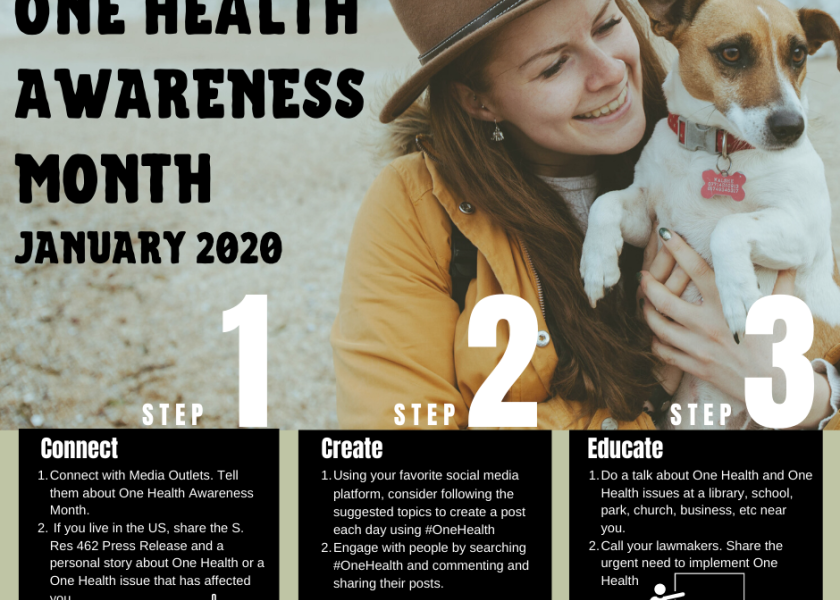Resolution Designates January as “One Health” Awareness Month

From the offices of Senators Dianne Feinstein (D-Calif.) and Martha McSally (R-Ariz.).
In late December, the U.S. Senate unanimously passed a bipartisan resolution introduced by Senators Dianne Feinstein (D-Calif.) and Martha McSally (R-Ariz.) designating January as “National One Health Awareness Month” to promote, animal and environmental health scientists. collaboration between publc.
One Health is a relatively new term being used by health experts – including at the Centers for Disease Control and Prevention – to better focus on the linkages between human, animal and environmental health and the need to develop comprehensive solutions. For instance, public health specialists are now working with physicians and veterinarians to minimize the inappropriate use of antibiotics in human and animal patients to combat antibiotic resistance.
“By using the ‘One Health’ approach, global health problems including antibiotic resistance and the spread of infectious diseases can be more easily addressed,” Senator Feinstein said. “Our resolution will hopefully draw attention to the need for holistic approaches to addressing human health that take into account changes in environmental and animal health. With diminishing resources and a growing human population, fighting problems with a ‘One Health’ approach must be encouraged now more than ever.”
“The health of our population is dependent on the interconnection of people, animals, and the environment,” said Senator McSally. “I was glad to join Senator Feinstein in introducing this resolution designating January as National One Health Awareness Month to promote ‘One Health’ and its growing collaboration in order to make our world a healthier place.”
Full text of the resolution follows:
Designating January 2020 as ``National One Health Awareness Month'' to promote awareness of organizations focused on public health, animal health, and environmental health collaboration throughout the United States and to recognize the critical contributions of those organizations to the future of the United States.
- Whereas One Health is a collaborative, multisectoral, and transdisciplinary approach, working at the local, regional, national, and global levels, with the goal of achieving optimal health outcomes recognizing the interconnection between people, animals, plants, and their shared environment;
- Whereas the mission of One Health is to establish closer professional interactions, collaborations, and educational opportunities across the various medical, veterinary, and environmental health professions and their allied science professions to simultaneously improve public health, animal health, and environmental health;
- Whereas the increasing threats posed by emerging diseases shared between animals and people, foodborne, vector-borne, and waterborne diseases, and other environmental factors may support the need for an integrated effort by professionals from multiple disciplines, including health, science, technology, and engineering;
- Whereas, according to the Centers for Disease Control and Prevention, up to 75 percent of new or emerging infectious diseases in people are spread by animals;
- Whereas, each year, International One Health Day is November 3; and
- Whereas One Health is essential to combating and strengthening the surveillance of emerging and reemerging diseases: Now, therefore, be it Resolved, That the Senate designates January 2020 as “National One Health Awareness Month” to promote awareness of organizations that focus on One Health efforts to improve the quality of life for people and animals; recognize the efforts made by such organizations in using a One Health approach to prevent epidemics; and recognize the importance of using the One Health approach to simultaneously protect the health of people, animals, plants, and the environment in the United States.







